

How the gig economy is reshaping the college degree. After high school, Kusal Kularatne, who has been living in Kansas City, Kan. since 2013, opted to stray from the traditional collegiate path.
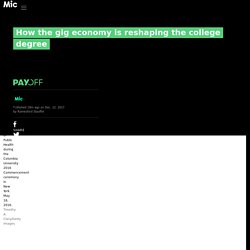
Rather than heading off for four years of classes and a major, he decided that real-world work experience, fueled by internships and guidance from mentors, was a smarter avenue for him. “I recognized that there are some things you just can’t learn at school,” he told Mic. “I think people need to get out of this outdated mentality that a four-year degree is the definitive path to success.” At one point, college served as a key signal that you were armed with the experience and education needed to successfully land a job. Today’s reality is more complicated: Half of recent college grads are not using skills they learned in college at work, according to a study from the Rockefeller Foundation. But everything outside the hallowed halls of higher education has shifted. For decades, attending college was justified as education for education’s sake. Speed Up Your Editing With These 22 Premiere Pro Tips.
Master Adobe Premiere Pro with these shortcuts.
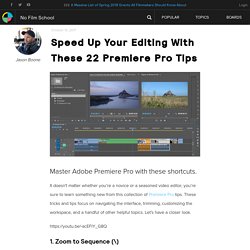
Fordfoundation. Why the Ford Foundation wants technologists to join the fight for social justice. As part of our new Technology Fellows program, we’re looking for tech experts to join the foundation’s grant making teams.

The fellows will help Ford’s program officers, grantees, and partners better leverage the Internet and information technology to advance social justice and challenge inequality. Learn more and apply here. So, why is a foundation hiring technologists? Information technology suffuses every aspect of our lives, and the challenges and opportunities it presents for civil society and social justice are greater than ever.
It’s very important that government and public service organizations understand the technical landscape, and how developing technologies can serve the public interest, and we believe philanthropy has a unique role to play in making that happen. As technology transforms the landscape of philanthropy and social justice, the traditional tools of policy, research, regulation, community engagement, and communications simply aren’t enough. Department of Technology Enhanced Learning. Modern Filmmakers Are 'Content Creators': How to Break into Digital TV.
According to a major production company VP, we're at a conjuncture in content creation where there are no rules.
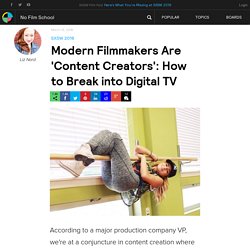
It's time to innovate. If anything became clear from my first day on the ground at SXSW 2016, it’s that “television” is no longer a dirty word for filmmakers. This was crystallized when I showed up to cover a panel called “Breaking into TV in the Digital Age” that took place in a 300-capacity room, and 200 people were turned away. Cinematographers Apply Old Tools With New Tech. Judging by this year’s awards-worthy entrants in the cinematography category, the format wars have been settled, and the winner is “all of the above.”

SEE MORE: Awards: The ContendersSEE MORE: Standalone Movies with a legitimate shot at trophies originated on everything from Super 16 film to Ultra Panavision 70, an anamorphic film gauge last used in 1966. Cinematographers have always chosen format and lenses according to the opportunities offered by the story and the demands of the shoot. Is there a digital look as a new aesthetic value emerging? Quality in the artistic field or: Technical achievements and their aesthetic consequencesLecture by Rolf Coulanges BVK, translated by Herman Verschuur.at CINEC 2014 / Cine Congress „Creativity in the digital era", Munich 2014 Is there a digital look as a new aesthetic value emerging?
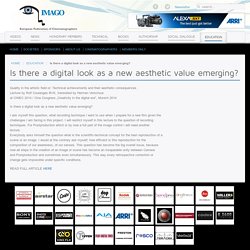
I ask myself this question, what recording technique I want to use when I prepare for a new film given thechallenges I am facing in this project. Three really real questions about the future of virtual reality. Why VR “Storytelling” does not currently work. And can it ever work? The Most Important Design Jobs Of The Future. Yesterday's graphic designers are today's UX designers.
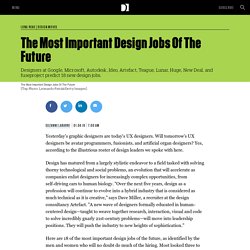
Will tomorrow's UX designers be avatar programmers, fusionists, and artificial organ designers? Yes, according to the illustrious roster of design leaders we spoke with here. Design has matured from a largely stylistic endeavor to a field tasked with solving thorny technological and social problems, an evolution that will accelerate as companies enlist designers for increasingly complex opportunities, from self-driving cars to human biology. "Over the next five years, design as a profession will continue to evolve into a hybrid industry that is considered as much technical as it is creative," says Dave Miller, a recruiter at the design consultancy Artefact. "A new wave of designers formally educated in human-centered design—taught to weave together research, interaction, visual and code to solve incredibly gnarly 21st-century problems—will move into leadership positions.
The next "big thing" is not a thing. Log In. The Shape of VR to Come: 5 predictions about VR filmmaking in 2016. The Shape of VR to Come: 5 predictions about VR filmmaking in 2016 As one of the co-founders of Metta, the virtual reality video platform for mobile (launching soon), I’m lucky enough to have the opportunity to see hundreds of experiments in VR video every week.
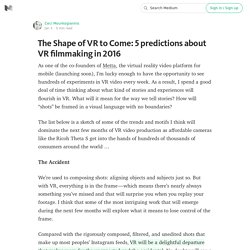
As a result, I spend a good deal of time thinking about what kind of stories and experiences will flourish in VR. What will it mean for the way we tell stories?